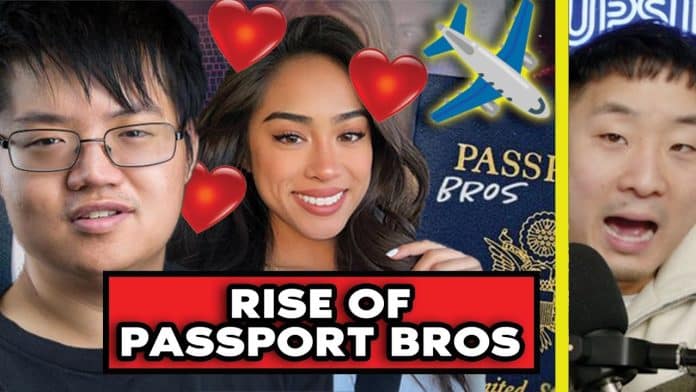In our increasingly interconnected world, the rise of digital nomadism and remote work has given birth to unique social trends and movements, including the Passport Bros. This group, primarily comprised of Black American men, seeks romantic relationships with foreign women, predominantly from South American and South Asian countries.
They believe these women possess specific values absent in their American counterparts, sparking a controversial debate on dating culture and racial perceptions.
It aims to delve into the Passport Bros movement, exploring its origins, spread, current state, and the factors contributing to its controversial nature. Join us as we navigate this intriguing phenomenon that has significantly impacted modern dating culture and the digital nomad lifestyle.
Initial Spread
This ideology found a home on YouTube around the late 2010s, where Passport Bros content creators and travel vloggers began to emerge. These early creators, such as DJP and BMT Travels, laid the groundwork for the Passport Bros movement by sharing their travel experiences and dating overseas. Their videos, often comparing women from different countries, attracted considerable viewership, leading to a cult following. By 2020, the philosophy had permeated platforms like Twitter, further adding to its popularity.
Present-Day Passport Bros
Fast-forward to 2023, Passport Bros has evolved into a group of digital nomads who primarily seek to date foreign women overseas. Austin Abeyta, a prominent figure in the Passport Bros movement, shares his passport-bro lifestyle with millions on TikTok. He argues that dating is easier overseas than in the U.S. because Americans are perceived as exotic.
The rise of digital nomadism and the increasing popularity of remote work has led to an estimated 17 million Americans travelling the world while working remotely. This trend has further bolstered the rise of the Passport Bros movement. On TikTok, the hashtag #passportbros has garnered almost 420 million views, with men predominantly from the West promoting their lifestyle of partying in distant places while working remotely and showcasing local women they meet along the way.
Austin Abeyta, a self-described passport bro, has divided users with his claim that “dating overseas is easier for a variety of reasons.” He cites the perceived exoticism of Americans abroad, the excitement locals exhibit when showing their country, and the financial advantage due to strong American currency as primary reasons for the dating ease overseas.
Despite the criticisms and controversies surrounding this movement, Passport Bros continue to polarize the internet and the Black community with a mix of criticism and support. Their impact on modern dating culture and digital nomad lifestyle signifies the changing dynamics of romantic relationships in an increasingly globalized world.
A Deep Dive into the Digital Nomadic Lifestyle Movement
The Passport Bros, a term that has gained significant traction on social media, refers to a group of primarily Black American men who are proponents of dating foreign women, primarily from South American and South Asian countries. This article explores this intriguing movement’s origins, development, and current state.
The Genesis
The Passport Bros movement traces its roots back to the mid-2000s when the phenomenon of Brazilian sex tourism started garnering attention among Black American men. A key milestone was an article published by writer Jelani Cobb in 2006 titled “Blame It On Rio,” which discussed the romantic and sexual experiences of African-American men vacationing in Brazil. This article, which emphasized the racial aspects of these men’s experiences, notably influenced the nascent movement.
The Influence of Media
Media, mainly social media, played a significant role in spreading and developing the Passport Bros ideology. A documentary released by independent filmmaker Al Greeze in 2010, titled “Frustrated,” further propagated the idea of Black American men seeking romantic opportunities overseas. Based on Cobb’s article, the film spotlighted the migration of these men from the U.S. to Brazil, contributing to the momentum of the Passport Bros movement.
The Rise of Passport Bros Content Creators
The late 2010s saw the emergence of Passport Bros content creators on YouTube. Influencers like DJP and BMT Travels began sharing content related to their travel experiences and dating perspectives, thereby shaping the narrative of the movement. These early creators cultivated a devoted following with engaging content comparing women from different countries. By 2020, the Passport Bros philosophy had permeated other social media platforms like Twitter, significantly expanding its reach.
The Modern Passport Bros
As of 2023, Passport Bros represent a group of digital nomads primarily seeking to date foreign women overseas. Austin Abeyta, a key figure in the contemporary movement, shares his lifestyle with millions on TikTok. Abeyta contends that dating is easier overseas due to the perceived exoticism of Americans, an assertion that has sparked considerable debate.
The increasing popularity of remote work and the rise of digital nomadism have further amplified the Passport Bros movement. With an estimated 17 million Americans travelling the world while working remotely, the appeal of the Passport Bros lifestyle has grown considerably. On TikTok alone, the hashtag #passportbros has amassed almost 420 million views, indicating the widespread interest in this lifestyle.
Summary
While the Passport Bros movement continues to generate a mix of criticism and support, it undeniably signifies a shift in romantic relationships in our increasingly globalized world. The impact of this movement on modern dating culture and the digital nomad lifestyle is a testament to the ever-changing dynamics of personal relationships in the age of digital connectivity.



